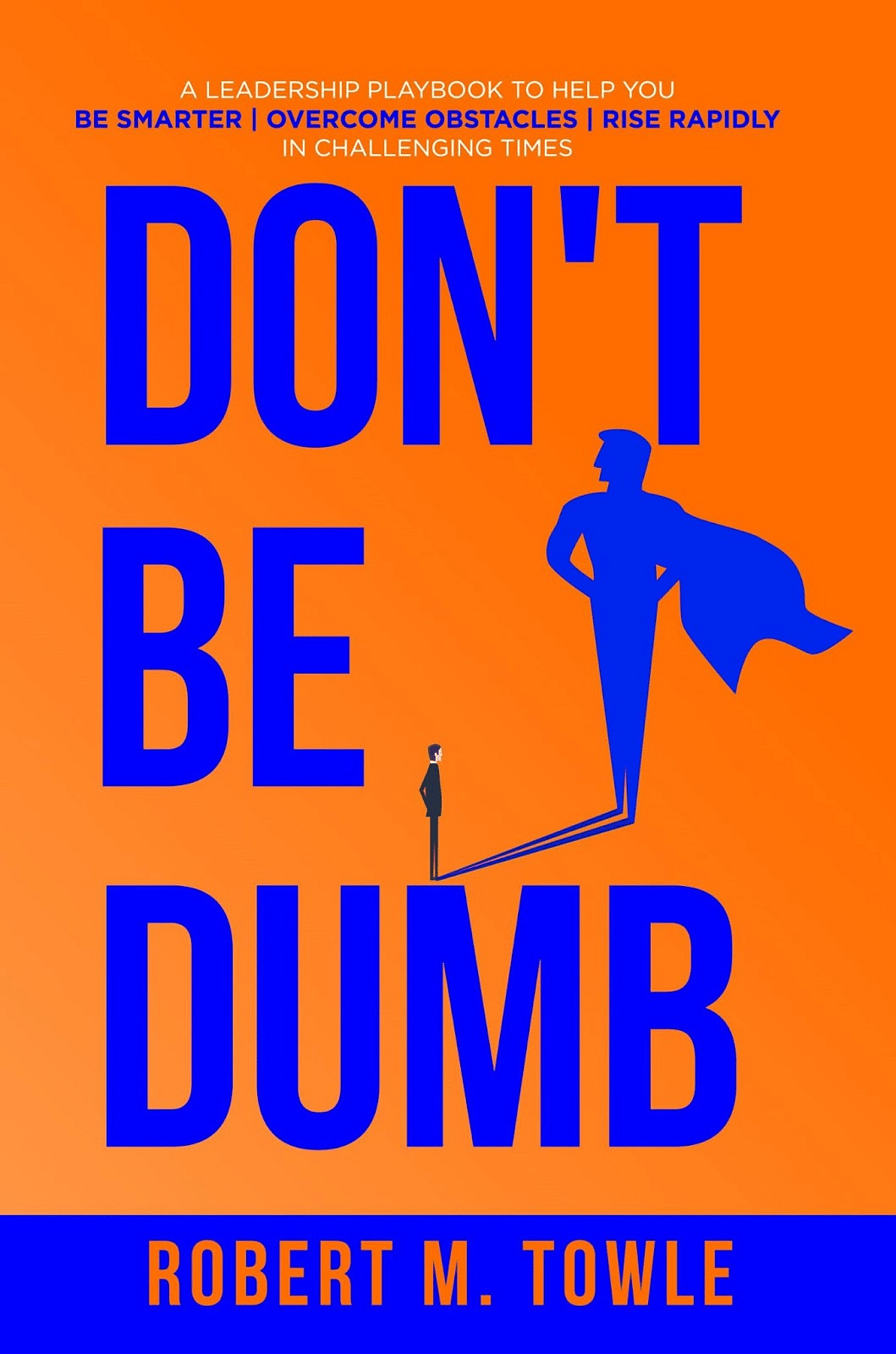
‘Don’t Be Dumb’: This Chief Financial Officer-turned-consultant-and-author tells you how to get your brand noticed
By Jim James, Founder EASTWEST PR and Host of The UnNoticed Entrepreneur.
Joining all the way from Radford in Virginia, Robert Towle was featured in the latest episode of The UnNoticed Entrepreneur where he talked about his book called “Don’t Be Dumb.” He also shared the journey he had from being a Chief Financial Officer (CFO) to an entrepreneur and coach of other entrepreneurs.
Image from LinkedIn
On His Book’s Title
The title of Robert’s book, “Don’t Be Dumb,” is the one point that got him into a confrontation with his publisher because they were saying that it’s negative. However, he defended that it’s not — it’s about being smarter. It’s not about not doing stupid things every day, but attempting to not be dumb.
This comes from a piece of advice that he got from his dad when he was about 13 years old. His mom was looking for his dad to give him nice advice over the breakfast table. And his dad just looked up at him over his coffee and said, “Yeah, don’t be dumb.”
It stuck with him all these years. Not that he has always followed it. But, Robert considers it a unique way to get the point across that you can do better and you should try not to make mistakes — and if you do, how do you recover.
This sets the context for the book, which revolves around the questions: How do you lead and develop as an entrepreneur? How do you recover from mistakes that you make as rapidly as possible? How do you become more resilient? And how can you rise as a business and grow your business more quickly especially in these challenging times?
Image from Amazon
Interjecting Fun is the Key
When asked about his learnings about rising as a business and inevitably having more people within the company, he shared an example from his corporate finance days.
Back then, he said that they’d interject fun into the workplace. They did something like awarding a “golden shoes” award, wherein an old pair of sneakers were spray-painted gold and put on a stand.
Every month, they’d give them to the employee who exhibited the best customer service of walking a mile in their customers’ shoes. Though it’s just old sneakers, people wanted the award and looked forward to who will win it in the succeeding month. It interjected some fun in a unique way to the point that they’d display it in their cubicle or in their office until the next month when a new awardee gets it.
According to Robert, interjecting fun has always been part of his approach. As you’re spending a lot of time at work, you’d want to have a good time. More importantly, it is your team members — the people working for you — who’d get you to success.
A couple of years ago, he came across some fish prints. It’s based on a fish market in Seattle. It’s just a regular market until a new owner came along and found a way to make it fun. Suddenly, they’re singing songs about the fish, they’re throwing the fish back and forth, and they’re interacting with customers in a playful manner.
If there’s any place where you could be miserable, it would be there because fish can be stinky and the outdoors can be too cold. But instead, they turned it around completely and it has now become a tourist attraction. People come to their fish market to buy their fish. They’ve also done consulting, teaching other people how to interject fun into the workplace.
This is about making a difference to your stakeholders, customers, and employees, and being present for them — as opposed to being distracted by whatever you got that you need to work on (whether it’s your bills or your marketing plan). It’s about engaging with them every day and having fun with your employees. All these make a huge difference.
This can be likened to how one baseball team turned the sport into an entertainment-based sport rather than a performance-based one; how they brought back the fun to it.
One of Robert’s favourite teams is the Houston Astros and their farm team at the time was out in Tucson. They would come out and play with each other once a year. He got to see them in Tucson in a small stadium.
When he looked at the players, he thought that they looked different than what they did on TV although their jerseys and names were the same. Then, he realised that they had traded their jerseys with each other and were imitating each other’s stances and approaches to baseball. He got over his irritation because at first, he wanted to see them play like they normally do, but he realised that they were making it entertaining for themselves and for their fans.
Recovering From Mistakes
Part of the message of Robert’s “Don’t Be Dumb” book is to not over-worry about the work and try to make it as fun as possible. This applies not just in work but in life in general as well. It also ties to the recovery strategies that he talks about.
Image from Unsplash
Many entrepreneurs get tangled up in not wanting to make mistakes. But the reality is, you’re going to make mistakes. You’re going to get yourself in bad situations. However, you shouldn’t take it so seriously. Instead, find a way to turn it around, improvise, adapt, overcome, and improve. You can get yourself out of nearly everything if you don’t take yourself too seriously and just go, “Wow, that was a bad idea. Now, what do we do?”
As an example, he shared how he ended up with what he’d call the worst conference call in history.
He was kicking off a major project with a client that he’d worked on for four years and made the mistake of using their conference call system instead of his own. For the big introductory kick-off call, there were hundreds of people around the world. Robert and his team had no control over their system and their system would introduce everybody who joined. The first 10 minutes of a 30-minute call was interrupted constantly because of that. He had 10 minutes of being able to talk clearly before everybody started leaving, wherein the system also announced the departures.
He was sitting there and frantically talking to his IT person when he’s on mute in between the notifications, trying to get him to change the system (which he can’t). As he finished the dreadful call, he thought to himself, “That’s it. We’re done.” As they were in London at the time, he even thought that his client may not pay for him and his team to fly back home. The whole assignment was finished.
One of the lessons that he learned out of that is that you’ve got to own your mistake. You have to acknowledge it and have a recovery plan.
In his case, the plan was to do another call the next day and do it in his system. He got a window time of five minutes to get down the hall and save it and if he’d hesitated, he’d lose the chance forever. He can’t simply sit and moan about his fate or mistake. He just has to find a way to recover. And he did. It worked and it turned into a year-and-a-half assignment that they’re able to work on very well. It’s not only because he owned the mistake. He also said what he’s going to do to fix it, improve, and recover.
As to what his recommended platform of communication will be, Robert mentioned that there are pros and cons of using Microsoft Teams or Zoom. Traditionally, he used Skype but it got a little bit clunky over time and not nearly as good as it used to be. He also tried using the two aforementioned apps.
According to him, Teams has an advantage because you can also have a repository of documents that you can share with the people you’re interacting with. When you’re working on projects or have ongoing interactions, Teams wins over Zoom in that sense.
On the other hand, Zoom works well for having the ability to interact with lots of people. But it also has limitations, such as how long you can be on a Zoom call (which is 45 minutes if you don’t have a Zoom account). Therefore, you have to be willing to pay extra to have unlimited amounts of time.
Your platform of choice still depends on what purpose you’re using it for.

From a CFO to Consultant
Robert transitioned from a CFO in corporate companies including investigative agency Pinkerton, to being a Hawaiian shirt-wearing business consultant and author.
It took him a while because, in finance, you typically want to be wearing a brown suit or blue blazer and just be in the background. You don’t want to necessarily stand out; you want to be that voice of stability and remain unrecognised or not seen very often. You don’t want to be in that position because that’s for the Chief Executive Officer (CEO) to be in. They’re more of the outward, recognisable figure.
However, in consulting, you have to stand out because you are your brand. How do people know you for who you are? This led to him wearing his now-signature Hawaiian shirt (he even got one as a Christmas gift from his wife, which she said he can use on other podcasts). This branding has helped him have a place because there’s only so much space that people have in their heads to recognise brands known for something.
How He Wrote ‘Don’t Be Dumb’
Robert had a brain tumor that was successfully removed. It was a wake-up call for him, prompting him to want to give back from his experiences and see if he can take a different approach to things. That was the genesis of writing his stories down.
For his book, Robert started off writing random stories and it was going absolutely nowhere other than some interesting stories about him. Then he found a way to link those, using popular music as the beginning of the themes of each chapter and tying things together that way.
He found a way to connect the random stories and they all sort of came together.
The impact has been really positive. He published the book in October. It took him a fair amount of time to get there — from editing to getting the book ready to be published along with its cover design and other things. He’s got incredible reviews on Amazon, including reviews from people that he’s worked with through the years (going all the way back to the early jobs that he had).
There was a guy that he worked for and several of Robert’s experiences with him are in the book. That guy downloaded the book and stayed up at night reading it, and he wrote him an email at two in the morning saying, “Wow, everything you’re saying makes a lot of sense. And you’ve had some interesting experiences I didn’t even know about. And I endorse everything you’ve said. This was absolutely fantastic.” This wasn’t even a public review, but waking up in the middle of the night and reading that made him feel very good about the book’s positive impact.
Using His Book to Help Build His Brand
Robert’s idea for his book is to be a lead magnet for his consulting business.
Through the book, he tried to give away elements that would provide an answer when a reader asks, “I can use this type of advice. How do I apply it?” For example, at the end of the sections, he talked about the action steps that you can take. He also included an appendix of some tools that you can use. However, the key is in making them interested enough to the point that they’d call or email and get help.
He published the book and it has been getting reviews on Amazon. He also has publications on LinkedIn and Facebook to talk about things. He also goes to podcasts like mine, sharing links on LinkedIn and Facebook to get the word out about the book.
Image from Unsplash
To do all this, he followed the rule that he learned while spending time in India and it’s about outsourcing things if you can. In his case, he hired a firm to help him find podcasts that would be a good fit. They do a lot of the heavy work including sending out enquiries, connecting to podcast producers, and following up with them. This allows him to focus on delivering to existing customers and promoting his book.
For outsourcing podcast bookings, he mentioned that there’s a fixed fee for a six-month period of time, with a fixed guaranteed number of podcasts. Across the six months, it would cost him about $1,800 a month.
Like how it is in guesting on podcasts, selling books can lead to more engagements with clients. In fact, he has already gained some local and international clients.
Robert has a passion for working with entrepreneurs. His grandfather opened his own shoe store and when Robert was growing up, he helped his grandfather with his store. Now, he has sort of returned to that, applying the corporate skills that he learned to help smaller enterprises.
Rising Rapidly
In the final section of his book, Robert talked about rising rapidly. It’s based on a song called “The Cape.”
Basically, the song is about a boy who tied a cape around his neck and thought that he could fly. He then jumped off their garage and he kept the cape throughout his life. The message here is that he didn’t know that he couldn't fly, so he did.
Rising rapidly is about being not hesitant. Don’t be afraid because you don’t know everything or because you’re not perfect. Put on your cape and fly. You can do it, go forward, and achieve great things.
Coming from someone who’s broken a few bones and done some stupid things, he stressed out that gravity is not pleasant but you can still pick yourself up and keep moving forward.
To find out more about Robert Towle and his book “Don’t Be Dumb,” check out his LinkedIn and Facebook page. You can also visit his business website, www.636advisors.com, and his book website, www.dontbedumb.expert.
This article is based on a transcript from my podcast The UnNoticed Entrepreneur, you can listen here.
Image from Saulo Mohana on Unsplash





